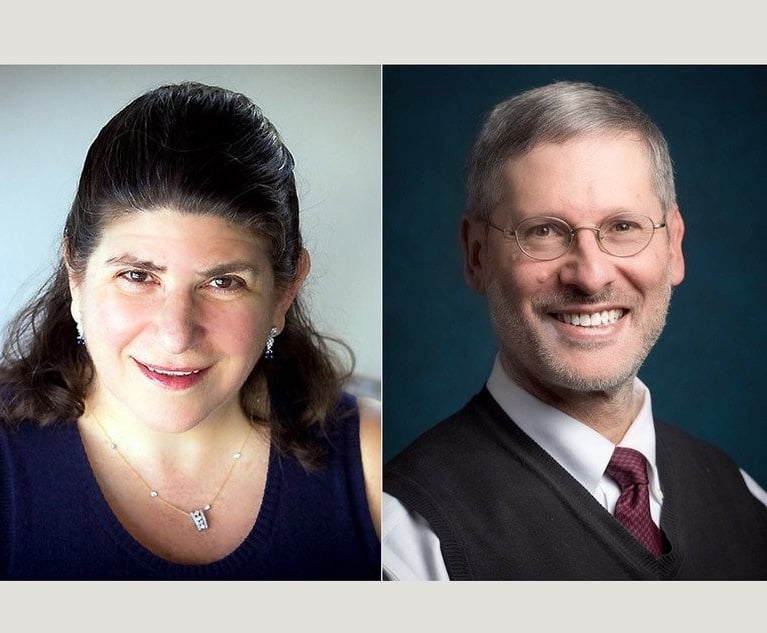 Matheu D. Nunn partner with Einhorn, Barbarito, Frost, Botwinick, Nunn & Musmanno. Courtesy Photo
Matheu D. Nunn partner with Einhorn, Barbarito, Frost, Botwinick, Nunn & Musmanno. Courtesy Photo Attorney of the Year Finalist: Matheu Nunn's Supreme Court Successes
"When you get to the Supreme Court, there really shouldn't be any surprises about what the issues are," Nunn said.
October 22, 2024 at 12:47 PM
5 minute read
For the past decade, divorce lawyers and family law judges have been grappling with a major question left open when the legislature passed an amendment to the alimony statute, which, for the first time, referenced "cohabitation" as a basis for adjusting alimony payments.
It may sound like a niche issue, but the resulting confusion over how parties can prove their former spouse is cohabitating with another and what the minimum evidentiary threshold is for bringing such claims led to thousands of motions being filed, countless hours of argument and a patchwork of case law, where a certain argument or factual showing in one county could lead to completely different results in the next county over.
NOT FOR REPRINT
© 2025 ALM Global, LLC, All Rights Reserved. Request academic re-use from www.copyright.com. All other uses, submit a request to [email protected]. For more information visit Asset & Logo Licensing.
You Might Like
View All
Reminder: Court Rules and Statutes Apply to Pendente Lite Custody Decisions
8 minute read
Trending Stories
- 1Who Is Nicholas J. Ganjei? His Rise to Top Lawyer
- 2Delaware Supreme Court Names Civil Litigator to Serve as New Chief Disciplinary Counsel
- 3Inside Track: Why Relentless Self-Promoters Need Not Apply for GC Posts
- 4Fresh lawsuit hits Oregon city at the heart of Supreme Court ruling on homeless encampments
- 5Ex-Kline & Specter Associate Drops Lawsuit Against the Firm
Who Got The Work
J. Brugh Lower of Gibbons has entered an appearance for industrial equipment supplier Devco Corporation in a pending trademark infringement lawsuit. The suit, accusing the defendant of selling knock-off Graco products, was filed Dec. 18 in New Jersey District Court by Rivkin Radler on behalf of Graco Inc. and Graco Minnesota. The case, assigned to U.S. District Judge Zahid N. Quraishi, is 3:24-cv-11294, Graco Inc. et al v. Devco Corporation.
Who Got The Work
Rebecca Maller-Stein and Kent A. Yalowitz of Arnold & Porter Kaye Scholer have entered their appearances for Hanaco Venture Capital and its executives, Lior Prosor and David Frankel, in a pending securities lawsuit. The action, filed on Dec. 24 in New York Southern District Court by Zell, Aron & Co. on behalf of Goldeneye Advisors, accuses the defendants of negligently and fraudulently managing the plaintiff's $1 million investment. The case, assigned to U.S. District Judge Vernon S. Broderick, is 1:24-cv-09918, Goldeneye Advisors, LLC v. Hanaco Venture Capital, Ltd. et al.
Who Got The Work
Attorneys from A&O Shearman has stepped in as defense counsel for Toronto-Dominion Bank and other defendants in a pending securities class action. The suit, filed Dec. 11 in New York Southern District Court by Bleichmar Fonti & Auld, accuses the defendants of concealing the bank's 'pervasive' deficiencies in regards to its compliance with the Bank Secrecy Act and the quality of its anti-money laundering controls. The case, assigned to U.S. District Judge Arun Subramanian, is 1:24-cv-09445, Gonzalez v. The Toronto-Dominion Bank et al.
Who Got The Work
Crown Castle International, a Pennsylvania company providing shared communications infrastructure, has turned to Luke D. Wolf of Gordon Rees Scully Mansukhani to fend off a pending breach-of-contract lawsuit. The court action, filed Nov. 25 in Michigan Eastern District Court by Hooper Hathaway PC on behalf of The Town Residences LLC, accuses Crown Castle of failing to transfer approximately $30,000 in utility payments from T-Mobile in breach of a roof-top lease and assignment agreement. The case, assigned to U.S. District Judge Susan K. Declercq, is 2:24-cv-13131, The Town Residences LLC v. T-Mobile US, Inc. et al.
Who Got The Work
Wilfred P. Coronato and Daniel M. Schwartz of McCarter & English have stepped in as defense counsel to Electrolux Home Products Inc. in a pending product liability lawsuit. The court action, filed Nov. 26 in New York Eastern District Court by Poulos Lopiccolo PC and Nagel Rice LLP on behalf of David Stern, alleges that the defendant's refrigerators’ drawers and shelving repeatedly break and fall apart within months after purchase. The case, assigned to U.S. District Judge Joan M. Azrack, is 2:24-cv-08204, Stern v. Electrolux Home Products, Inc.
Featured Firms
Law Offices of Gary Martin Hays & Associates, P.C.
(470) 294-1674
Law Offices of Mark E. Salomone
(857) 444-6468
Smith & Hassler
(713) 739-1250








